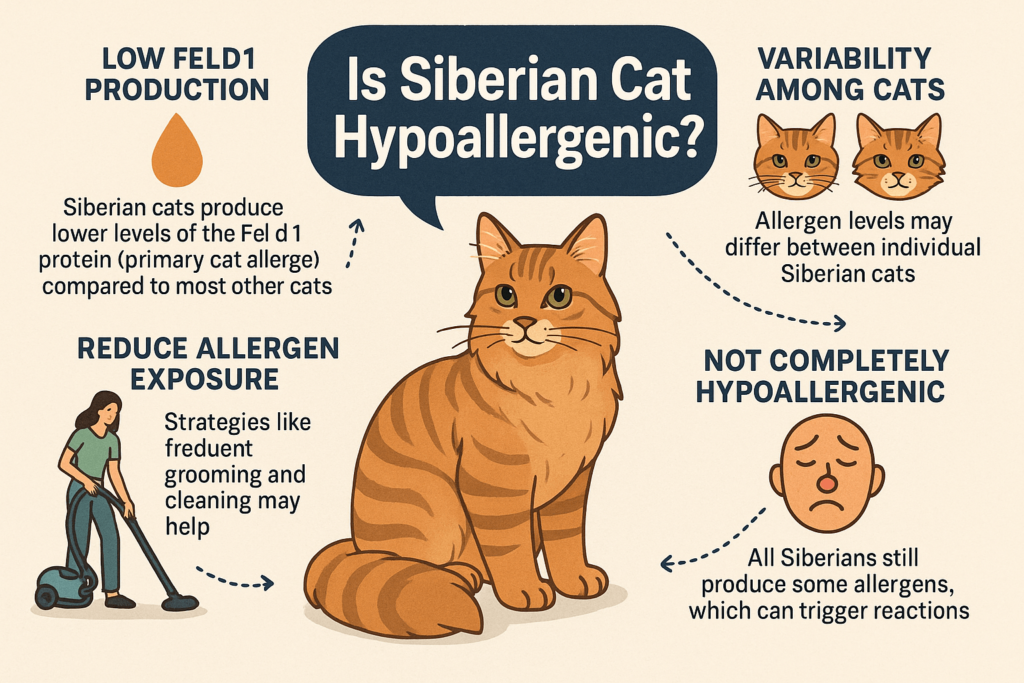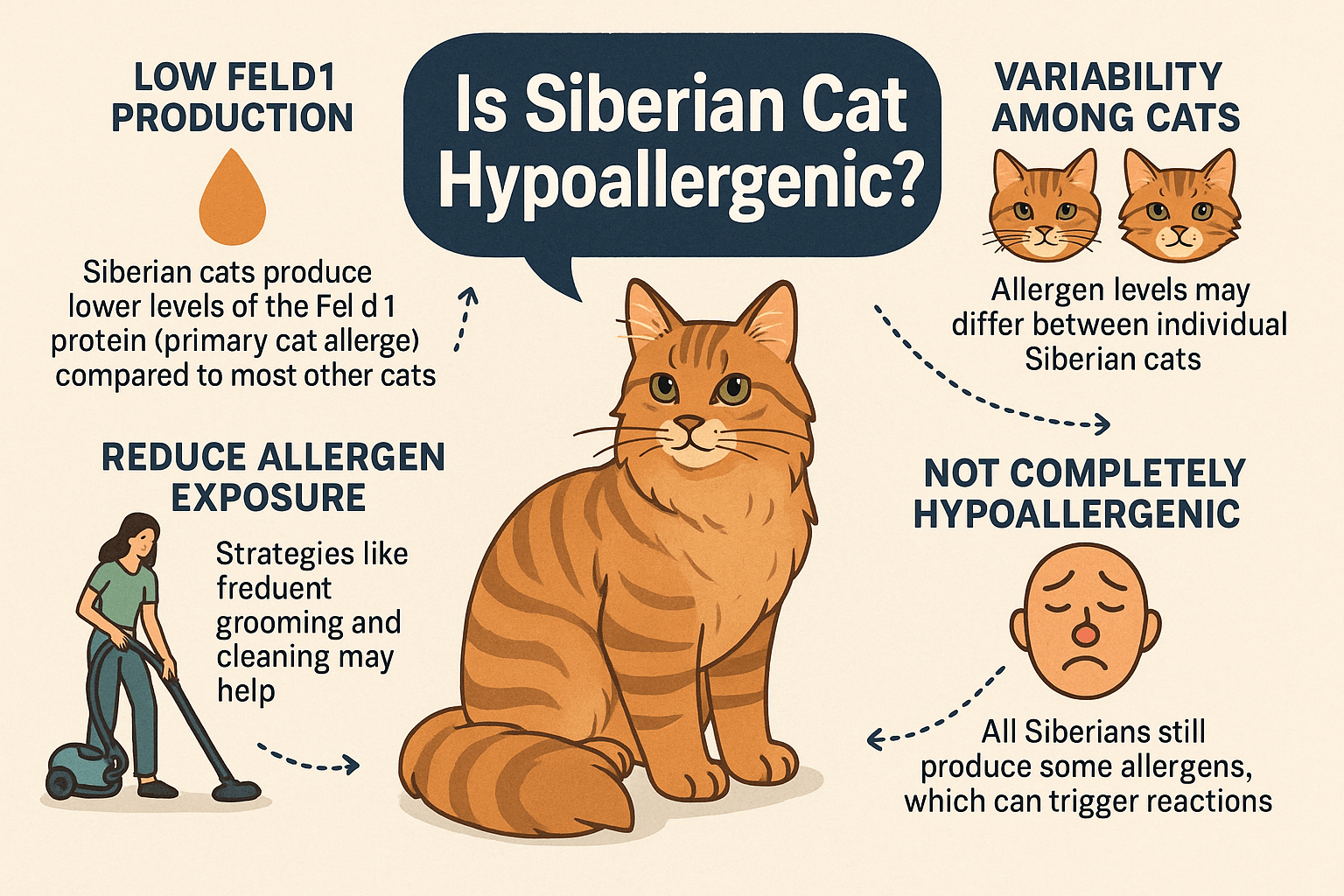Is the Siberian Cat Hypoallergenic?
For cat lovers who suffer from allergies, finding a feline companion that fits their lifestyle can feel like searching for a needle in a haystack. The Siberian cat, with its majestic appearance and affectionate personality, is often touted as a hypoallergenic breed. But what does this term really mean, and can these cats truly coexist with allergy sufferers? While no cat is completely allergen-free, some breeds produce fewer allergens than others, making them more tolerable for sensitive individuals. In this blog post, we’ll explore the science behind cat allergies, why the Siberian cat is considered hypoallergenic, and whether it might be the perfect match for you.
What Makes the Siberian Cat Unique?
The Siberian cat’s reputation as a hypoallergenic breed stems from specific traits that set it apart from other felines. These characteristics make it an appealing choice for allergy sufferers seeking companionship.
Low Fel d 1 Protein Levels:
Fel d 1 is the primary allergen found in cat saliva. Studies suggest that Siberian cats produce lower levels of this protein compared to most other breeds.Thick, Water-Repellent Coat:
Their triple-layered coat is designed to withstand harsh climates, but it may also reduce the spread of allergens due to its unique structure.Natural Grooming Habits:
Siberians are meticulous groomers, which may help minimize loose fur and dander—a common allergen carrier.Affectionate Yet Independent Nature:
While they enjoy human interaction, Siberians aren’t overly clingy, potentially reducing prolonged exposure to allergens.Historical Tolerance Reports:
Many owners report successfully living with Siberians despite having mild to moderate cat allergies, adding anecdotal evidence to their hypoallergenic claims.
These factors contribute to the Siberian cat’s status as a hypoallergenic option, though individual experiences may vary significantly.

Understanding Cat Allergies and Why They Matter
Cat allergies affect millions of people worldwide, but understanding how they work is key to managing symptoms and finding compatible pets. Here’s what you need to know about cat allergens and their impact.
Fel d 1 Protein Is the Main Culprit:
This allergen is secreted through a cat’s skin, saliva, and urine, spreading via shedding and grooming behaviors.Dander Carries Allergens:
Tiny flakes of dead skin, known as dander, serve as carriers for allergens, making them airborne and easily inhaled.Severity Varies by Individual:
Some people experience mild sneezing or itching, while others face severe respiratory issues when exposed to cats.Not All Cats Produce Equal Allergens:
Certain breeds naturally produce fewer allergens, which explains why hypoallergenic options like the Siberian exist.Environmental Factors Play a Role:
Air quality, cleaning routines, and ventilation systems influence allergen levels in your home.
By understanding these dynamics, you can better assess whether a Siberian cat—or any pet—might suit your needs.
Check this guide 👉How Long Do Siberian Cats Live? Best 7 Health Tips!
Check this guide 👉Siberian Maine Coon Mix: Best 7 Expert Tips!
Check this guide 👉Siberian Cat vs Maine Coon: Best 7 Expert Tips!
Pros of Choosing a Siberian Cat | Cons of Choosing a Siberian Cat |
|---|---|
Produces lower levels of Fel d 1 protein | May still trigger allergies in sensitive individuals |
Affectionate and family-friendly | Requires regular grooming due to thick coat |
Known for playful yet calm temperament | Can be expensive to purchase initially |
Suitable for homes with children/pets | Needs plenty of space to climb and explore |
Hypoallergenic qualities supported by many owners | Not all Siberians are low-allergen; variability exists |
Tips for Managing Allergies with a Siberian Cat
If you’re considering a Siberian cat despite allergies, there are practical steps you can take to minimize reactions and create a harmonious environment.
Frequent Bathing and Brushing:
Regularly bathing and brushing your Siberian can help remove loose fur and reduce allergen buildup.Invest in an Air Purifier:
High-efficiency particulate air (HEPA) purifiers trap airborne allergens, improving indoor air quality.Clean Your Home Often:
Vacuum carpets, wash bedding, and dust surfaces regularly to keep allergens at bay.Create Allergy-Free Zones:
Designate certain areas, like bedrooms, as off-limits to your cat to give yourself a break from exposure.Consult an Allergist:
Before committing, consult a medical professional to determine if a Siberian cat is a viable option for your condition.
By taking proactive measures, you can increase your chances of enjoying life with a Siberian cat without significant discomfort.
How to Test Your Compatibility with a Siberian Cat
Before bringing a Siberian cat into your home, testing your compatibility is crucial to avoid disappointment or health risks. These steps will guide you through the process.
Visit a Breeder or Owner:
Spend time around Siberian cats to observe how your body reacts to their presence.Request Allergy Testing:
Some breeders offer samples of fur or saliva for testing with your allergist to gauge sensitivity.Start Small with Short Visits:
Begin with brief interactions and gradually increase exposure to see how your system responds over time.Ask About Specific Lineage:
Certain bloodlines within the Siberian breed are believed to produce even fewer allergens, so inquire about lineage details.Consider Fostering First:
Foster a Siberian temporarily to assess long-term compatibility before making a permanent commitment.
Taking these precautions ensures you make an informed decision that benefits both you and the cat.
Common Misconceptions About Hypoallergenic Cats
Misunderstandings about hypoallergenic cats abound, leading to unrealistic expectations among potential pet owners. Clarifying these misconceptions helps set accurate expectations.
Hypoallergenic Does Not Mean Allergen-Free:
Even hypoallergenic cats produce allergens—it’s just that they produce fewer or less potent ones.Breed Alone Isn’t a Guarantee:
Individual cats within hypoallergenic breeds can vary greatly in their allergenic properties.Short Hair Doesn’t Always Help:
Contrary to popular belief, short-haired cats aren’t necessarily better for allergy sufferers; it’s the amount of Fel d 1 protein that matters most.Allergic Reactions Depend on Immune Systems:
Two people exposed to the same cat may react differently based on their unique immune responses.Regular Cleaning Still Matters:
Owning a hypoallergenic cat doesn’t eliminate the need for diligent cleaning and maintenance.
Understanding these truths ensures realistic expectations when considering a hypoallergenic cat like the Siberian.
Health Benefits of Living with a Siberian Cat
Beyond their hypoallergenic qualities, Siberian cats offer numerous physical and emotional health benefits that enhance daily life.
Stress Reduction:
Interacting with cats has been shown to lower stress levels and promote relaxation.Improved Cardiovascular Health:
Studies suggest that pet ownership can reduce blood pressure and improve heart health.Emotional Support:
Siberians are known for forming strong bonds with their humans, providing comfort during tough times.Encourages Physical Activity:
Playing with your cat keeps you active and engaged, promoting overall wellness.Sense of Routine and Purpose:
Caring for a pet fosters responsibility and structure, which can positively impact mental health.
These benefits highlight why owning a Siberian cat can enrich your life far beyond allergy management.
Preparing Your Home for a Siberian Cat
Bringing a Siberian cat into your home requires thoughtful preparation to ensure a smooth transition and a safe environment.
Designate Safe Spaces:
Provide vertical climbing spots and cozy hiding places where your cat can retreat when feeling overwhelmed.Remove Toxic Plants:
Ensure your home is free of plants or substances toxic to cats, such as lilies or cleaning chemicals.Secure Windows and Doors:
Install screens or barriers to prevent accidental escapes, especially since Siberians are curious explorers.Stock Up on Supplies:
Gather essentials like food bowls, litter boxes, toys, and grooming tools tailored to Siberians’ needs.Establish a Feeding Schedule:
Create a consistent feeding routine to maintain your cat’s health and well-being.
Preparing your home thoughtfully sets the stage for a happy and harmonious relationship with your new furry friend.
Frequently Asked Questions About Siberian Cats and Allergies
Are all Siberian cats hypoallergenic?
No, not all Siberians produce low levels of Fel d 1 protein, but many do exhibit hypoallergenic qualities.
Can I live with a Siberian cat if I have severe allergies?
Severe allergy sufferers should proceed cautiously and consult a doctor before adopting any cat.
Do Siberian cats require special care?
Their thick coats need regular grooming, but otherwise, they’re relatively low-maintenance pets.
How much does a Siberian cat cost?
Prices vary widely, typically ranging from $1,000 to $3,000 depending on breeder reputation and location.
Where can I find reputable Siberian cat breeders?
Look for breeders registered with recognized organizations and prioritize those prioritizing ethical practices.
Weighing the Benefits of a Siberian Cat for Allergy Sufferers
While no cat is entirely hypoallergenic, the Siberian cat stands out as one of the best options for allergy sufferers seeking a loving companion. Its lower production of Fel d 1 protein, combined with proper management strategies, makes it possible for many individuals to enjoy the joys of cat ownership without overwhelming symptoms. However, every person’s immune response is unique, so thorough testing and preparation are essential. With patience and care, a Siberian cat could become a cherished member of your family, proving that love and companionship can transcend even the toughest challenges.
Dog Tapeworm Life Cycle: Best 7 Expert Tips! – Learn how tapeworms infect dogs, spot symptoms, and break the cycle with expert prevention strategies.
Anxious Cat Body Language: Best 7 Expert Tips! – Learn to spot signs of stress, understand triggers, and help your cat feel safe and relaxed.
Anxious Dog Body Language: Best 7 Expert Tips! – Learn to spot signs of anxiety, respond effectively, and help your dog feel safe and secure.
Is Breeding Dogs Bad? Best 7 Expert Tips! – Explore the ethics, benefits, and risks of dog breeding to make informed decisions for a better future.





